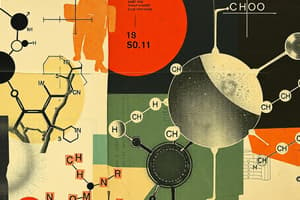Podcast
Questions and Answers
What is the branch of science concerned with the chemical processes that occur within living organisms?
What is the branch of science concerned with the chemical processes that occur within living organisms?
- Geology
- Physics
- Astronomy
- Biochemistry (correct)
Which type of bond involves the sharing of a pair of valence electrons between two non-metal atoms?
Which type of bond involves the sharing of a pair of valence electrons between two non-metal atoms?
- Ionic Bond
- Covalent Bond (correct)
- Polar Covalent Bond
- Non-Polar Covalent Bond
What type of molecule results in a slightly positive charge on one side and a slightly negative charge on the other side?
What type of molecule results in a slightly positive charge on one side and a slightly negative charge on the other side?
- Non-Polar Covalent Compound
- Ionic Compound
- Molecular Compound
- Polar Covalent Compound (correct)
Which type of bond involves the transfer of electrons from one atom to another, usually between a metal and a non-metal?
Which type of bond involves the transfer of electrons from one atom to another, usually between a metal and a non-metal?
In which type of intramolecular bond are the electrons shared equally between two atoms?
In which type of intramolecular bond are the electrons shared equally between two atoms?
What type of bond is characterized by the unequal sharing of electrons between atoms?
What type of bond is characterized by the unequal sharing of electrons between atoms?
What type of intermolecular force is the strongest force of attraction between a hydrogen atom of one molecule and extremely electronegative elements like fluorine, oxygen, or nitrogen in another molecule?
What type of intermolecular force is the strongest force of attraction between a hydrogen atom of one molecule and extremely electronegative elements like fluorine, oxygen, or nitrogen in another molecule?
What is one of the most important interactions in biochemistry that influences the structure and reactivity of biomolecules?
What is one of the most important interactions in biochemistry that influences the structure and reactivity of biomolecules?
What characteristic of water is mainly responsible due to hydrogen bonding?
What characteristic of water is mainly responsible due to hydrogen bonding?
In a water molecule, what do the partial positive hydrogen atoms have an attraction to in neighboring water molecules?
In a water molecule, what do the partial positive hydrogen atoms have an attraction to in neighboring water molecules?
When comparing H Hydrogen Bond, NOF Dipole-dipole Interaction, and London Dispersion Forces, which one is the strongest?
When comparing H Hydrogen Bond, NOF Dipole-dipole Interaction, and London Dispersion Forces, which one is the strongest?
Which type of intermolecular force is sometimes called Vander Waals forces?
Which type of intermolecular force is sometimes called Vander Waals forces?
Flashcards are hidden until you start studying




